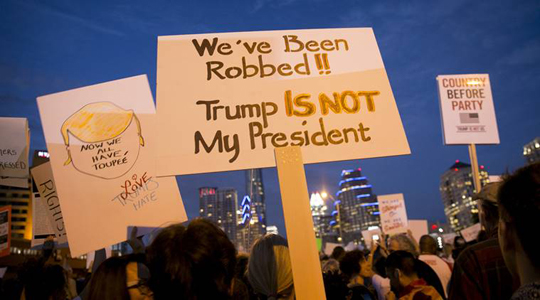Washington, Jan 21: Six police officers were injured and 217 protesters arrested after they smashed windows, damaged cars and threw rocks at security personnel near US President Donald Trump's inauguration ceremony on Friday in Washington DC. At least two police officers and one other person were taken to the hospital for undetermined injuries after run-ins with protesters, DC Fire Spokesman Vito Maggiolo told CNN. After the swearing-in ceremony, demonstrators near 12th and K streets threw rocks and bottles at police, who were clad in riot gear and attempting to disperse the crowd. A large number of police were on scene and used smoke and flash-bang devices to try to scatter the protesters.

Acting DC Police Chief Peter Newsham told CNN that there were several hundred protesters who were confronting police, while he praised the thousands of other demonstrators who behaved in a peaceful fashion to get their point across. “We have been pointing out all along that this is a very isolated incident and by and large everything is going peacefully and a lot of folks have come to the city to enjoy this historic day, not only the Capitol but walking all around the city,” Newsham said.
Throughout Friday, demonstrators, some wearing masks and dressed in black, shattered building windows, vandalized police cars and other vehicles, setting some on fire — including a limousine — and toppled news kiosks. “Pepper spray and other control devices were used to control the criminal actors and protect persons and property,” the police said.
Protester Lysander Reid-Powell, a 20-year-old student from New Mexico told CNN: “I think Donald Trump is a fascist, and it's very easy for people, especially people who are in pain, to slip into fascism.” At one checkpoint, about 50 protesters sat down in the street in an attempt to block Trump supporters from entering a secure area to watch the swearing-in ceremony and speech. Not far away, a group of immigration backers staged a “pop up” protest near another check point.
“We're here to take a stand against the ideas that Trump spouted throughout the course of this campaign — sexism, Islamophobia, his bigotry and nationalism,” said protester Jed Holtz, from New York City. There also were anti-Trump protests around the world, including London, Hong Kong and Berlin — where demonstrators held a sign that read, “Walls divide”, CNN reported.
In the West Bank, Palestinians protested against Israeli settlements and Trump's plan to move the US Embassy to Jerusalem from Tel Aviv. In New York, seven people were arrested at a demonstration outside of Trump Tower, according to the New York Police Department. On Saturday, the Women's March on Washington could attract a quarter million participants, organisers said.
“We're really trying to set a tone of resistance for the coming years,” Lacy MacAuley, a DisruptJ20 organizer, told CNN. “Donald Trump represents a shift in our politics in a dangerous, harmful, exclusionary direction. We oppose those policies of hate.” According to Department of Homeland Security chief Jeh Johnson, as many as 900,000 spectators were slated to attend inaugural ceremonies.





Comments
Add new comment